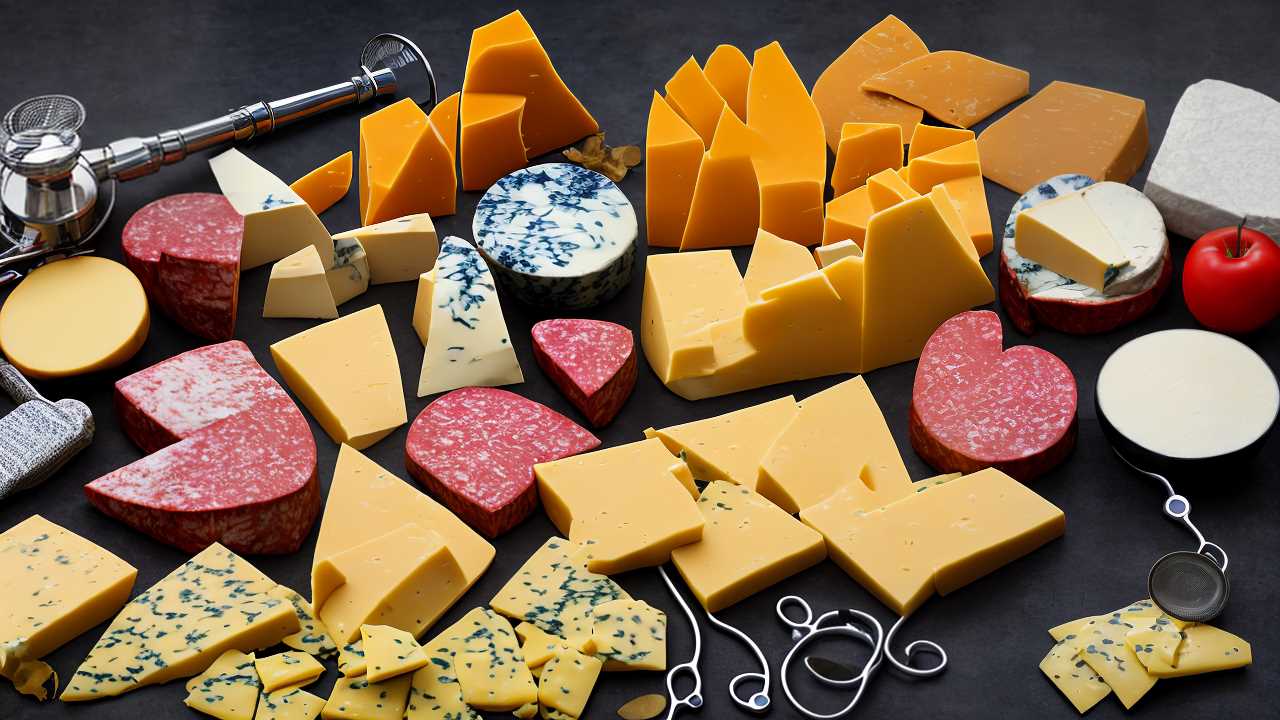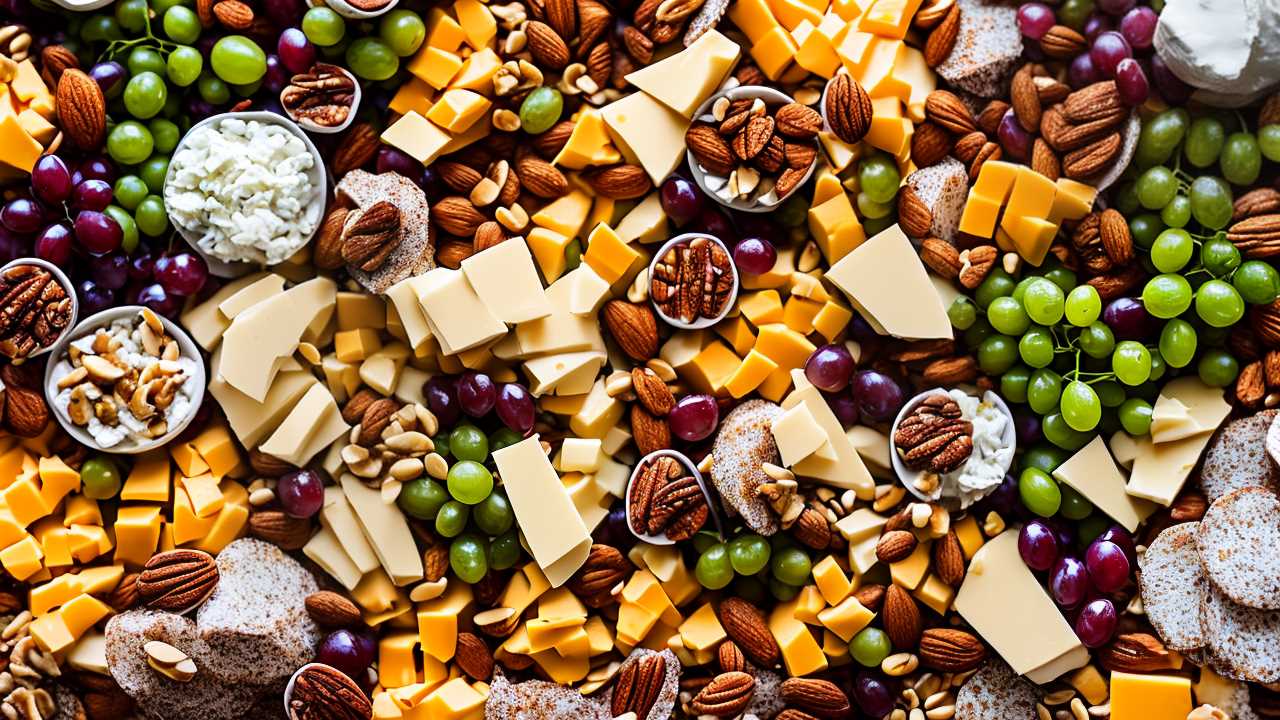
What Drug Does Cheese Release?
When you eat cheese, your body breaks down casein, a protein found in dairy products, into smaller fragments called casomorphins. These fragments have an opioid-like effect on your brain, similar to addictive drugs. They bind to opioid receptors, leading to the release of dopamine, a neurotransmitter associated with pleasure and reward pathways. This response can make cheese highly satisfying, contributing to feelings of well-being and even temporary euphoria. While this reaction can enhance your mood, it's also why you might find yourself craving cheese more often than you might expect. Exploring further can provide deeper insights into managing these cravings effectively.

Understanding Casein and Casomorphins

Cheese owes its addictive properties to casein, a protein found abundantly in dairy products. When you consume cheese, the casein proteins are digested and broken down into smaller fragments known as peptides. The structure of casein is such that it forms micelles, which are complex clusters that make it highly efficient in delivering calcium and phosphate.
This structure also plays a crucial role in how casein is broken down in your digestive system, leading to the release of casomorphins. As cheese production trends continue to evolve, the variety and availability of cheeses rich in casein are expanding, offering more opportunities for consumers to experience these effects.
Casomorphins are peptides that result from the digestion of the casein protein and have a profound impact on the human body. These fragments can bind to opioid receptors in the brain, similar to how drugs like morphine do. However, the effects of casomorphins are much milder compared to potent narcotics.
They're known to induce feelings of comfort and well-being, which is why you might find yourself reaching for that piece of cheese when you're feeling down or in need of comfort.
Understanding the role of casein and casomorphins can be crucial, especially if you're in a profession where nurturing and caring for others is paramount. Knowing about these effects can help you make informed decisions about dietary choices, not just for yourself but also for those you serve.
It's important to be aware of how seemingly benign substances like cheese can influence mood and behavior, enabling you to provide holistic care and advice.

The Opioid Effect of Cheese

When you indulge in a slice of cheese, you might unknowingly trigger a cascade of biochemical reactions reminiscent of opioid effects in your brain. This isn't just a metaphorical expression of your love for cheese; it's a scientifically observed phenomenon. The primary culprit behind this reaction is casein, a protein predominantly found in cheese.
As you digest cheese, casein breaks down into smaller fragments known as casomorphins, which have opioid characteristics. Casomorphins interact with opioid receptors in the brain, the same receptors that drugs like heroin and morphine target. This interaction can induce feelings of pleasure and well-being, explaining why cheese is often considered comforting and addictive.
While the effect of casomorphins is much milder compared to strong narcotics, it's significant enough to influence our eating behavior and potentially lead to cheese addiction. The diverse range of cheese varieties across different cultures highlights not only the global love for cheese but also underscores the widespread impact of its opioid-like effects.
Understanding these casein effects can empower you to make informed choices about your diet, especially if you're aiming to manage your intake of potentially addictive substances. For those engaged in dietary counseling or health education, this knowledge is crucial.
It allows you to serve others effectively by providing insights into why some food choices might be harder to resist and what they're doing to our brains on a biochemical level.

Health Implications of Cheese Addiction

Understanding the health implications of cheese addiction is crucial, especially given its opioid-like effects on the brain. While cheese offers nutritional benefits such as providing calcium and protein, excessive consumption can lead to adverse health conditions, influenced by both psychological factors and physical dependencies.
Cheese contains casein, which releases casomorphins during digestion, acting on dopamine receptors similarly to opioids. This reaction not only enhances your mood temporarily but also triggers a craving cycle that can be tough to break. It's important to balance your intake and be aware of the signs of overconsumption.
Additionally, exploring the different types of cheese can help diversify your diet and potentially moderate consumption by choosing varieties lower in fat and sodium.
Here are three major health implications of cheese addiction:
- Increased Risk of Chronic Diseases: Excessive cheese consumption can contribute to the development of heart disease and stroke due to high levels of saturated fats and sodium, which can elevate cholesterol levels and blood pressure.
- Weight Management Issues: Cheese is calorie-dense and can lead to weight gain if not consumed in moderation. This can further escalate the risk of obesity-related health issues such as type 2 diabetes, certain cancers, and joint problems.
- Psychological Dependency: The pleasurable feelings cheese induces can lead to psychological dependency, making it difficult to reduce consumption despite negative health consequences. This can impact your overall quality of life and mental health.
It's essential to approach cheese consumption with mindfulness, recognizing its benefits while being cautious of its addictive potential. Moderation is key to enjoying cheese without compromising your health.

Managing Cheese Cravings

To effectively manage your cravings for cheese, it's important to identify the triggers that prompt these desires. By understanding what initiates your cheese cravings, you can develop strategies to control them. Often, these craving triggers are linked to specific situations or emotional states such as stress, boredom, or social environments where cheese is a central feature.
Once you've pinpointed the triggers, you can start replacing the habit of reaching for cheese with healthier alternatives or activities. For instance, if you find yourself craving cheese when stressed, try engaging in stress-reducing activities like yoga, meditation, or a simple walk. This substitution method not only helps in managing your cravings but also benefits your overall well-being.
Moreover, maintaining a balanced diet is crucial. Ensuring that your meals are nutritionally complete can reduce the intensity of your cheese cravings. Often, cravings stem from nutritional deficiencies or the body's way of signaling the need for certain nutrients. Incorporating a variety of foods in your diet can satisfy these nutritional needs more healthily and sustainably.
Lastly, don't underestimate the power of portion control. If avoiding cheese entirely is unrealistic, start by limiting the amount you consume at one time. You can gradually decrease the frequency and quantity of cheese in your diet, which might make the cravings less intense over time.

Alternatives to High-Casein Cheeses

If you're looking to reduce your intake of high-casein cheeses, consider exploring a variety of plant-based alternatives that provide similar textures and flavors without the high casein content.
Opting for these alternatives not only aligns with a dairy-free lifestyle but also supports those who are lactose intolerant or allergic to dairy proteins, ensuring everyone at your table can enjoy a delicious and inclusive meal.
Alternatives to High-Casein Cheeses:
- Vegan Cheese: Modern vegan cheeses have come a long way in mimicking the creamy, satisfying quality of traditional cheese. Made primarily from nuts like cashews and almonds, these products are rich in flavor and versatile in use.
Brands such as Miyoko's and Daiya offer a range of styles from soft fresh to aged hard cheeses, covering all your culinary needs.
- Nut-Based Alternatives: Apart from whole vegan cheeses, nut-based spreads and sauces can serve as excellent substitutes in recipes.
Cashew cream, for instance, is a fantastic base for making dairy-free spreads, dips, and even cheese-like sauces that are perfect for pasta or vegetables.
- Plant-Based Substitutes: Beyond nuts, options like coconut oil-based cheeses, tofu, and nutritional yeast provide additional dairy-free choices.
Nutritional yeast, in particular, is a powerhouse ingredient, offering a cheesy flavor that's perfect for sprinkling over popcorn or stirring into mashed potatoes.
Each of these alternatives not only helps you cater to various dietary needs but also contributes to a more sustainable and compassionate dining experience.

Frequently Asked Questions
Can Cheese Consumption Impact Lactose Intolerance Symptoms?
Yes, cheese consumption can indeed impact your lactose intolerance symptoms.
During cheese fermentation, most of the lactose is broken down, which can ease lactose digestion for you.
Therefore, you might find that you can tolerate certain cheeses, especially aged varieties like cheddar or parmesan, better than milk or other dairy products.
Always monitor your body's response and choose cheeses that align with your digestive comfort to serve your health needs effectively.
Does Cheese Affect Sleep Quality or Patterns?
You might find yourself tossing and turning after indulging in that late-night cheese platter.
Here's why: cheese can impact your sleep quality. It influences how your body manages sleep hormones, potentially leading to restless nights.
If you're battling cheese cravings, consider how they might disrupt your sleep patterns. Opting for less or timing it right could help you serve others better by being more alert and rested.
Are There Ethical Concerns With Cheese Production?
Regarding ethical concerns in cheese production, you need to consider animal welfare and labor practices.
The treatment of dairy cows and the conditions under which workers operate are paramount.
Ethical sourcing involves ensuring animals are treated humanely and workers receive fair wages and safe working conditions.
Supporting producers who adhere to these principles not only fosters better industry standards but also aligns with serving others by promoting justice and compassion in our food systems.
How Does Cheese Production Impact Environmental Sustainability?
Cheese production significantly impacts environmental sustainability. When you consider the process, significant amounts of water and energy are consumed, leading to high carbon footprints.
Additionally, cheese waste contributes to pollution unless managed properly. However, adopting sustainable practices, like waste reduction and energy-efficient technologies, can mitigate these effects.
It's crucial for producers to implement these practices to serve the broader community by preserving our natural resources and ensuring a healthier planet.
What Are the Cultural Significances of Cheese in Different Societies?
You might find it fascinating that 92% of French people consume cheese regularly, highlighting its deep-rooted cultural significance.
In many societies, cheese traditions aren't just about taste but also symbolize wealth and festivity. For instance, in Italy, the presence of Parmigiano-Reggiano at celebrations represents good fortune and prosperity.
Understanding these cheese symbolism helps appreciate how deeply these traditions are woven into the social and cultural fabric of communities dedicated to serving and celebrating together.

Conclusion
So, you've discovered the seductive powers of cheese, thanks to casein which releases casomorphins, mimicking opiates in your brain. It's a real "cheese high" that explains your cravings! But don't fret. By understanding this, you can manage your cheese indulgence better and explore lower-casein alternatives. Remember, knowledge is power. Armed with insight into your cheese cravings, you're better equipped to enjoy it wisely, keeping both your taste buds and health in check. Stay cheese-savvy!







